Overview
This article centers on essential SEO strategies specifically designed for family-owned wineries, aiming to enhance their online presence and boost direct-to-consumer sales. Implementing effective SEO techniques—such as keyword research, mobile optimization, and content marketing—can significantly elevate visibility and engagement. In a competitive market, these strategies lead not only to increased sales but also to enhanced customer loyalty. By recognizing the unique challenges faced by family-owned wineries, we can understand the critical role that effective SEO plays in achieving long-term success.
Introduction
The wine industry is undergoing a significant transformation as family-owned wineries enhance their online presence and engage directly with consumers. By implementing effective wine SEO strategies, these establishments can unlock substantial growth opportunities—ranging from increased online sales to the cultivation of loyal customer relationships. Yet, as the digital landscape continues to evolve, how can these wineries adeptly navigate the complexities of SEO and digital marketing to distinguish themselves in a competitive marketplace? This article explores seven essential strategies that family-owned wineries can adopt to elevate their visibility and achieve success in the direct-to-consumer sector.
Enocap: Transformative DTC Strategies for Family-Owned Wineries
Enocap is at the forefront of transformation in the wine industry, championing strategies that incorporate wine SEO and direct-to-consumer (DTC) approaches. By harnessing data-driven insights, the firm empowers family-owned vineyards to establish robust sales channels that foster direct engagement with consumers. This strategy not only amplifies but also facilitates access to crucial capital for expansion.
Enocap's comprehensive consulting services have proven effective, helping vineyards achieve e-commerce growth rates as high as 191% and converting casual visitors into loyal patrons through innovative demand generation techniques and enhanced wine clubs. The impact of these strategies is evident, with vineyards experiencing substantial increases in online sales and improved customer retention.
Notably, the DTC sales channel for wine achieved an impressive value of $4.2 billion in 2021, propelled by an 11.8% increase in average bottle prices. As vineyards adapt to the evolving market landscape, implementing effective DTC strategies for wine SEO has become vital for sustaining success and thriving in today's competitive arena. Building meaningful relationships with consumers remains a cornerstone of these strategies, ensuring that establishments not only attract new clients but also retain their dedicated customer base.
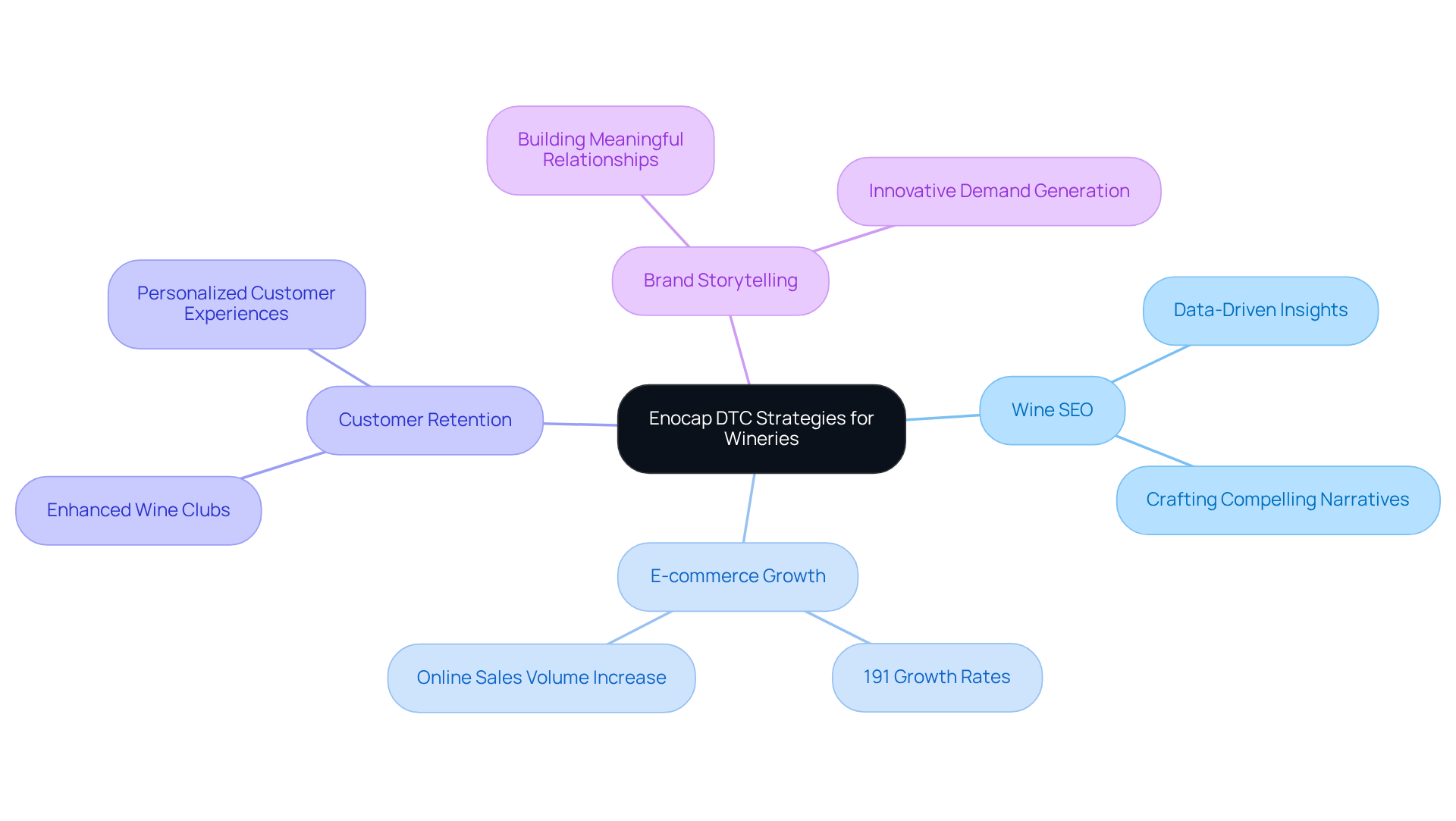
Google Search Console: Monitor and Optimize Your Winery's SEO Performance
Google Search Console (GSC) stands as an essential asset for vineyards seeking to elevate their online visibility and optimize SEO performance. By leveraging GSC, vineyards can meticulously monitor key metrics such as click-through rates, impressions, and keyword rankings. This data-driven approach empowers vineyards to pinpoint specific areas needing optimization, enabling timely adjustments to their SEO strategies.
Regularly examining GSC insights not only helps in identifying underperforming pages but also allows vineyards to adapt to shifting browsing behaviors, ensuring they remain competitive in search engine results. With 64% of inquiries conducted on mobile devices, through GSC is critical for attracting a broader audience.
Moreover, vineyards can utilize GSC to track organic traffic trends, evaluate the effectiveness of their SEO efforts, and ultimately drive more visitors to their sites, fostering growth in an increasingly digital marketplace. Additionally, the URL Inspection Tool allows wineries to verify how Google perceives specific pages and resolve indexing issues, while the Performance Report provides valuable insights into visibility features, total clicks, impressions, average CTR, and average position.
Emphasizing content quality is paramount, as it must meet user intent to secure a high ranking in search results.
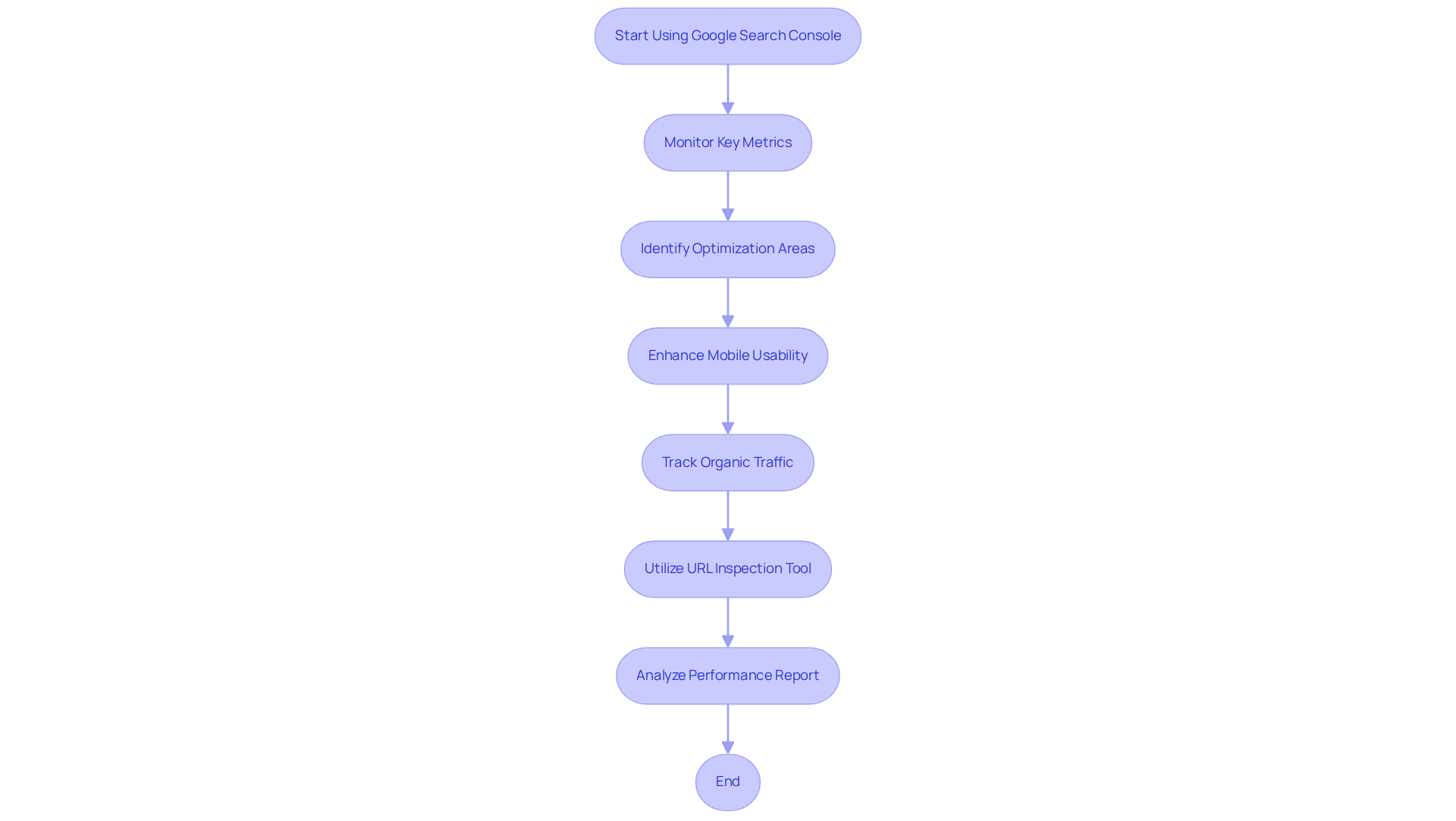
Schema Markup: Improve Search Visibility for Wine Products
Schema markup serves as a powerful type of microdata that significantly enhances how search engines interpret the content of your website. For vineyards, the strategic application of schema specifically tailored for wine products can dramatically elevate visibility in search queries, thereby improving wine SEO. This leads to the creation of rich snippets that capture attention and stand out prominently in search results. Such enhancements not only boost the visual appeal of search listings but also substantially increase the likelihood of attracting clicks from potential customers.
By integrating schema markup for essential product details, reviews, and pricing, businesses within the wine industry can effectively utilize wine SEO to optimize their online presence. Remarkably, pages that implement schema have demonstrated a 40% higher click-through rate compared to those that do not, highlighting the critical role of this strategy in driving traffic and fostering engagement. Additionally, with 72.6% of pages on the first page of Google employing schema, businesses that embrace this practice can secure a competitive edge in the digital marketplace.
However, it is crucial to recognize that only 30% of websites currently utilize schema, presenting a significant opportunity for vineyards to distinguish themselves in search results. To fully maximize the advantages of schema markup, wine producers should actively consider implementing specific types such as:
- Product schema
- Review schema
- Price schema
as part of their wine SEO strategy to enhance their product visibility and stand out in a crowded market.
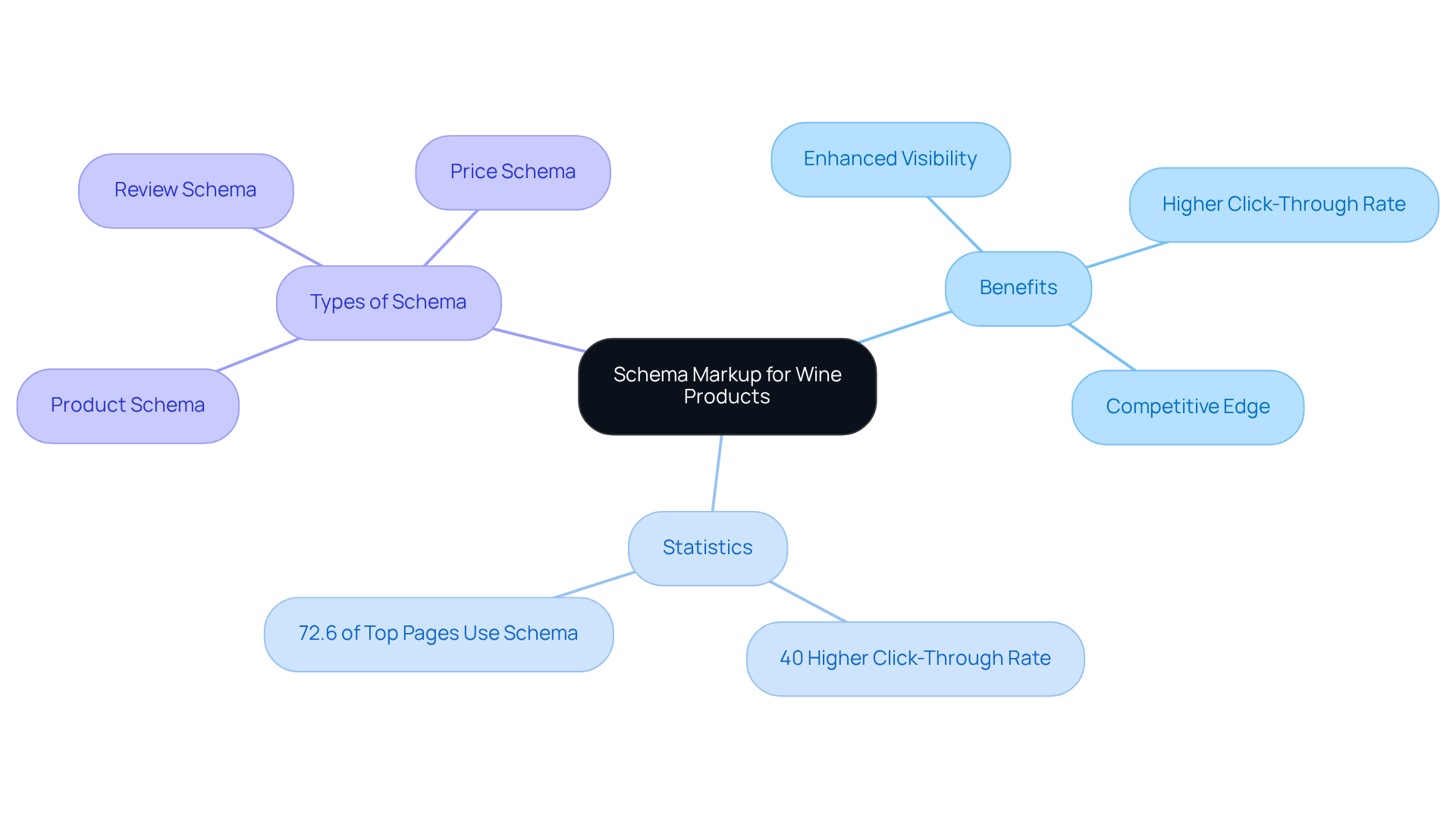
Keyword Research: Identify and Target Your Winery's Audience
Comprehensive keyword analysis is essential for vineyards aiming to engage effectively with prospective clients using wine SEO. By pinpointing the terms and phrases consumers utilize when searching for wine-related products, producers can strategically tailor their online presence using wine SEO to align with market demands. Tools such as prove invaluable in uncovering high-traffic keywords that resonate with the establishment's offerings.
Concentrating on wine SEO within website content, blogs, and product descriptions not only enhances search engine rankings but also draws more visitors to the site. Family-owned vineyards have adeptly implemented wine SEO strategies focusing on local and niche markets, which has resulted in increased visibility and engagement. For example, a vineyard that optimized its site for regional keywords witnessed a remarkable 30% increase in foot traffic and online sales.
Digital marketing specialists emphasize the significance of understanding consumer personas and search intent, which can lead to more effective targeting of audience segments related to wine SEO. By employing keyword research tools for wine SEO, vineyards can refine their approaches to ensure they attract the right visitors and convert them into loyal customers.
Furthermore, integrating strategic capital planning into these initiatives can further bolster growth and sustainability, aligning with Enocap's transformative DTC strategies that have enabled clients to experience an average e-commerce growth of 191% in 2020.
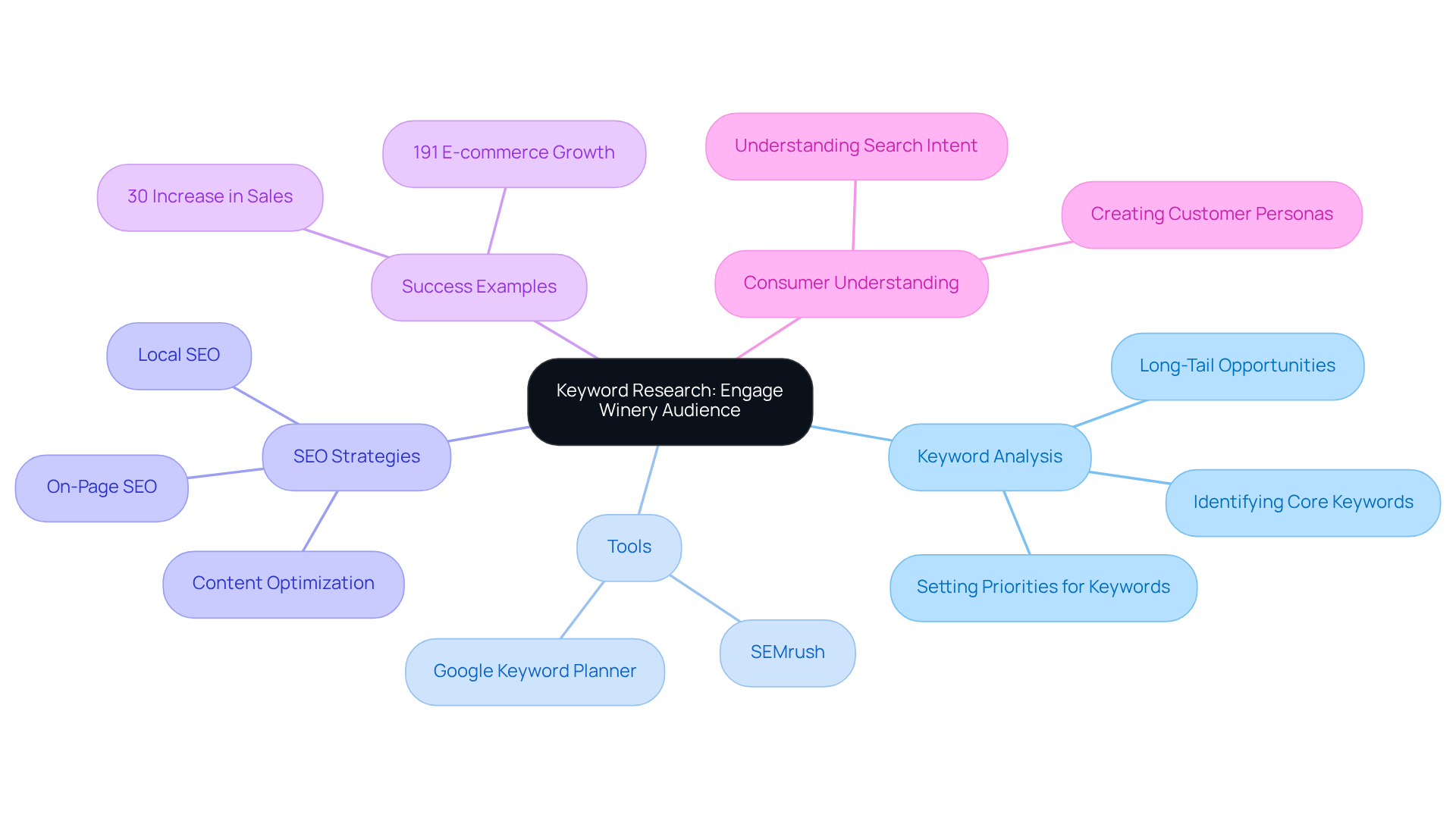
Mobile Optimization: Ensure Your Winery's Site is User-Friendly on All Devices
Mobile optimization is not just beneficial; it is essential for wine producers as consumer behavior increasingly shifts towards mobile browsing and shopping, making wine SEO crucial. A responsive and user-friendly website can significantly enhance engagement rates and reduce bounce rates. To achieve this, key elements must be prioritized:
- Fast Loading Times: Reducing mobile site speed by just 0.1 seconds can lead to an 8% increase in conversions. This statistic underscores speed as a vital factor in retaining potential customers.
- Easy Navigation: Simplifying the navigation process ensures that users can find what they need quickly, which is crucial for maintaining their interest and encouraging purchases.
- Mobile-Friendly Layouts: Implementing designs that adapt seamlessly to various screen sizes enhances user experience. By the end of 2021, mobile devices generated 54.4% of global website traffic, and 55.4% of internet users now utilize mobile phones for online purchases.
By concentrating on these aspects, vineyards can improve their wine SEO, creating a more captivating experience for patrons, ultimately boosting sales and nurturing loyalty among consumers. Furthermore, incorporating elements such as AI-driven personalization and social media shopping can further improve the mobile shopping experience, enabling producers to engage more effectively with their audience. As Enocap emphasizes, "The establishments that thrive in 2025 will be the ones that embrace digital storytelling and strategic capital planning," highlighting the necessity of adapting to these trends to maximize direct-to-consumer revenue and customer loyalty. Moreover, establishments that apply proven strategies can attain substantial e-commerce growth, with some seeing increases of up to 191% in online sales.
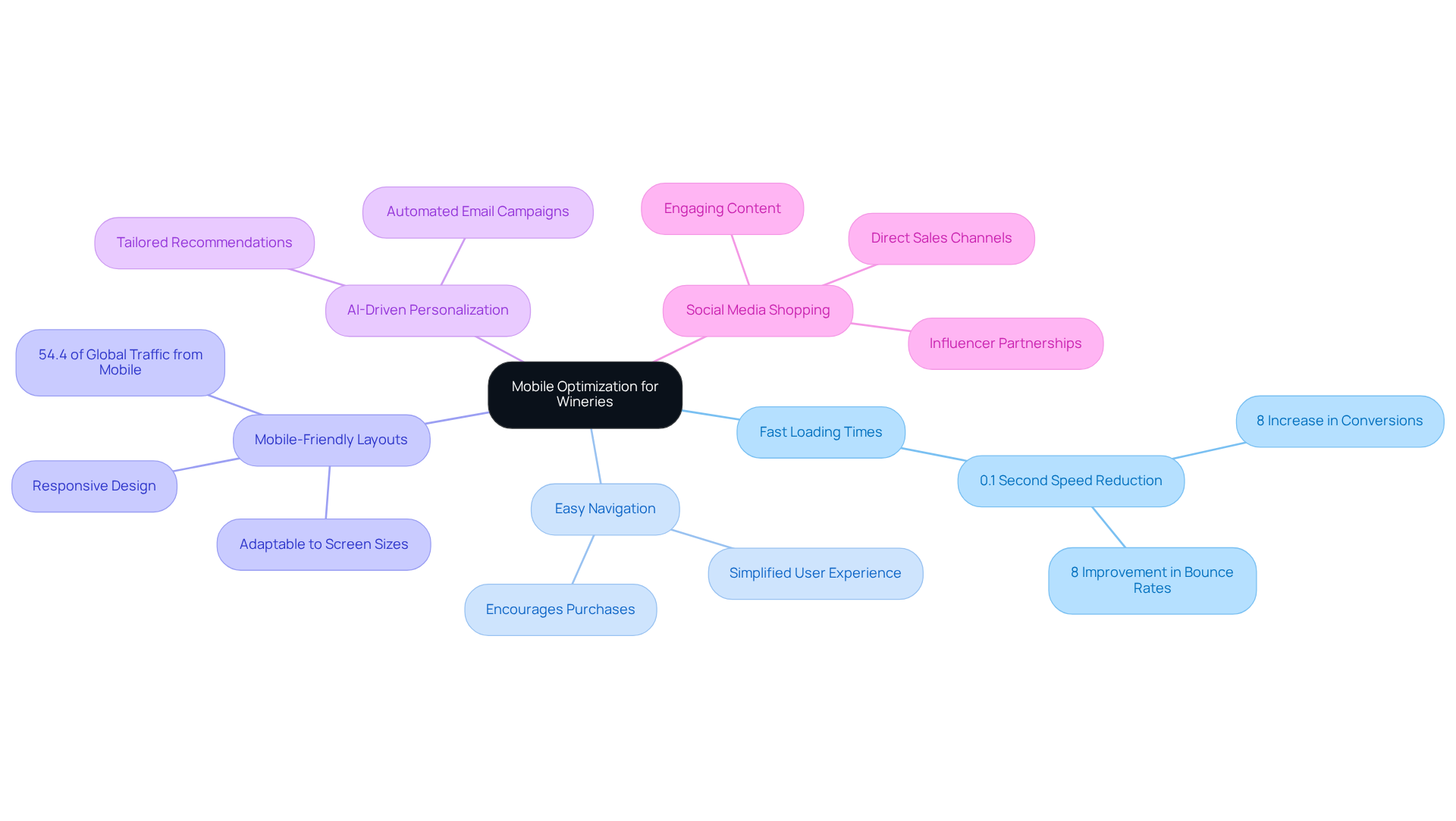
Content Marketing: Engage Customers with Compelling Wine Stories
Content marketing serves as a powerful tool for vineyards to convey their unique narratives, heritage, and the artistry behind their wines, especially when combined with wine SEO. By crafting engaging blog posts, videos, and social media content, wineries can establish deeper connections with their audience. Highlighting the vineyard's history, winemaking methods, and flavor descriptions creates a compelling story that not only attracts visitors but also encourages them to share their experiences. This strategy enhances client engagement and significantly influences sales, fostering long-term loyalty.
Current trends reveal that storytelling is increasingly essential in wine SEO, as consumers seek authentic connections and transparency from brands. Wineries that their unique narratives can distinguish themselves in a saturated market, ultimately driving sales and cultivating a loyal customer base.
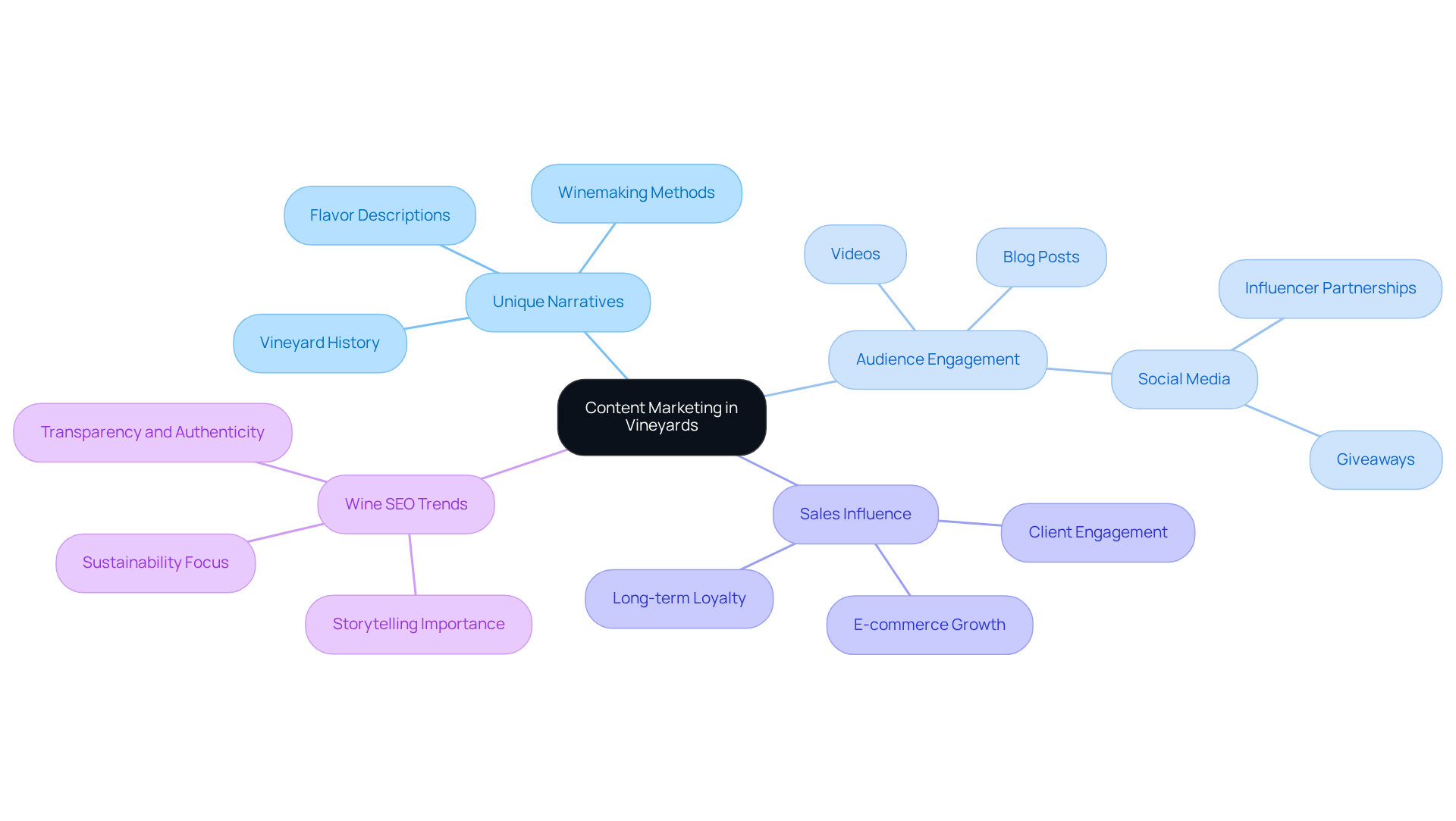
Backlink Strategies: Enhance Your Winery's Online Authority
Establishing a robust backlink profile is critical for enhancing a winery's online authority using wine SEO. By collaborating with influential wine bloggers, participating in industry events, and securing features in reputable wine-related publications, wineries can achieve this goal. Each backlink from a credible source signals to search engines that the establishment is trustworthy and relevant, significantly boosting search rankings.
Notably, nearly 50% of top-ranking pages contain reciprocal links, highlighting the necessity of cultivating relationships within the industry. To effectively enhance their online presence, wine producers must proactively seek opportunities for wine SEO by . These connections not only improve visibility but also contribute to long-term credibility in the competitive wine market.
As an expert in wine SEO, Ryan Jones emphasizes that comprehending both the searcher and the competitive landscape is vital for successful link-building endeavors. Moreover, Helen Pollitt points out that the most effective backlinks for wine SEO stem from authoritative and relevant websites, which is a crucial consideration for vineyards pursuing link-building strategies.
By focusing on creating valuable content and fostering relationships within the sector, vineyards can establish a strong online presence that attracts more clients. Furthermore, as Dave Davies notes, without quality content, even the most reputable backlinks may fail to deliver the desired outcomes. Therefore, vineyards should prioritize engaging and relevant content to maximize the effectiveness of their backlink-building initiatives.
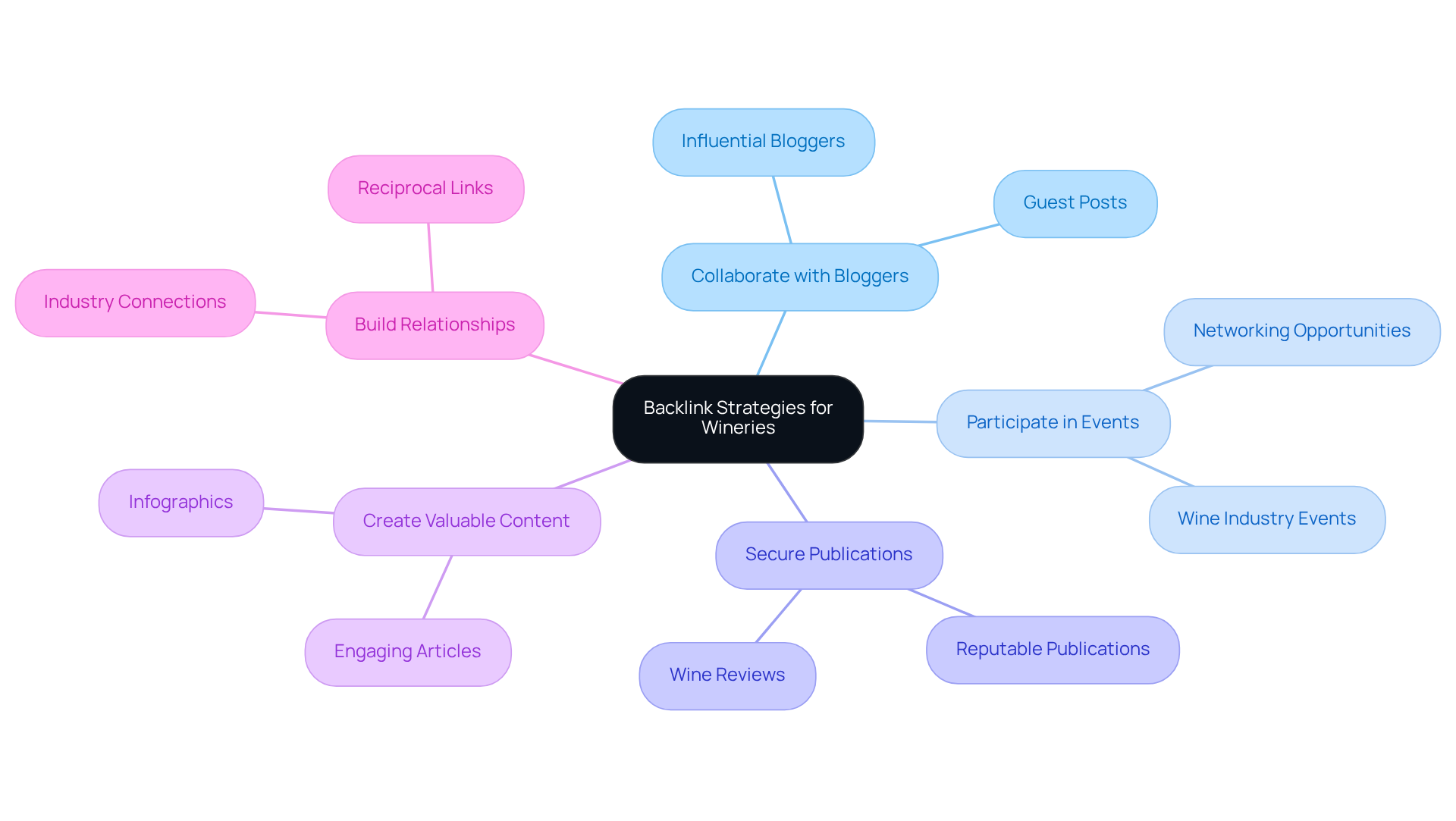
Social Media Marketing: Connect and Engage with Wine Enthusiasts
[Social media marketing](https://link.springer.com/article/10.1057/dddmp.2016.5) stands as a formidable avenue for vineyards to connect with wine enthusiasts and cultivate a dedicated customer base. Platforms such as Instagram, Facebook, and Twitter serve as essential tools for sharing updates, promotions, and engaging content that resonates with followers.
By authentically presenting their personality and values through engaging brand narratives, vineyards can cultivate a devoted community more likely to share their experiences and endorse the brand to others. Regular interaction through comments and direct messages not only enhances engagement but also builds trust and strengthens relationships with consumers.
Industry specialists underscore that vineyards effectively utilizing social media as part of their wine SEO can significantly enhance their visibility and sales, making it a vital element of their marketing strategy.
As we look to 2025, successful family-owned vineyards increasingly adopt personalized content and transformative direct-to-consumer approaches to engage their audience, showcasing the profound impact of wine SEO and social media marketing on wine sales.
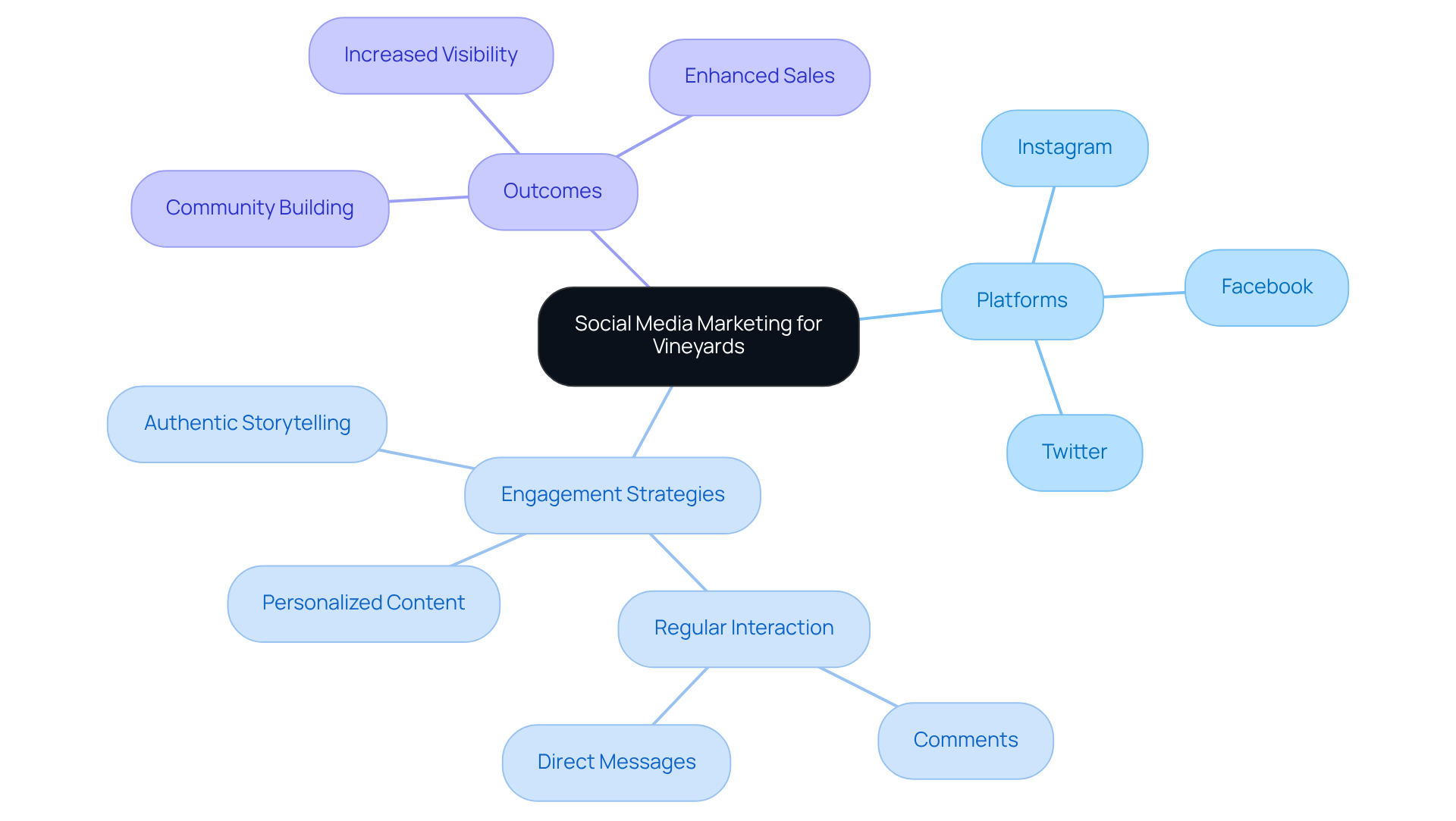
On-Page SEO: Optimize Your Winery's Website for Better Rankings
On-page wine SEO is essential for wineries aiming to enhance their online visibility and attract relevant traffic. By enhancing title tags, meta descriptions, header tags, and image alt texts with targeted keywords, wineries can significantly improve their wine SEO. High-quality, informative, and engaging content not only elevates user experience but also encourages visitors to linger longer on the site, positively impacting rankings.
Regularly updating content and maintaining a clean site structure are critical components of effective on-page SEO. SEO experts assert that vineyards employing can substantially elevate their search engine rankings and draw in more organic traffic. For example, optimizing product pages to load in under three seconds is crucial, as 53% of mobile users abandon sites that take longer.
Additionally, integrating schema markup can enhance visibility in search results, making it easier for potential clients to discover your offerings. Pages with schema markup implemented enjoy a 40% higher click-through rate than those without. By focusing on these on-page elements, vineyards can cultivate a more engaging online presence that resonates with consumers and drives sales.
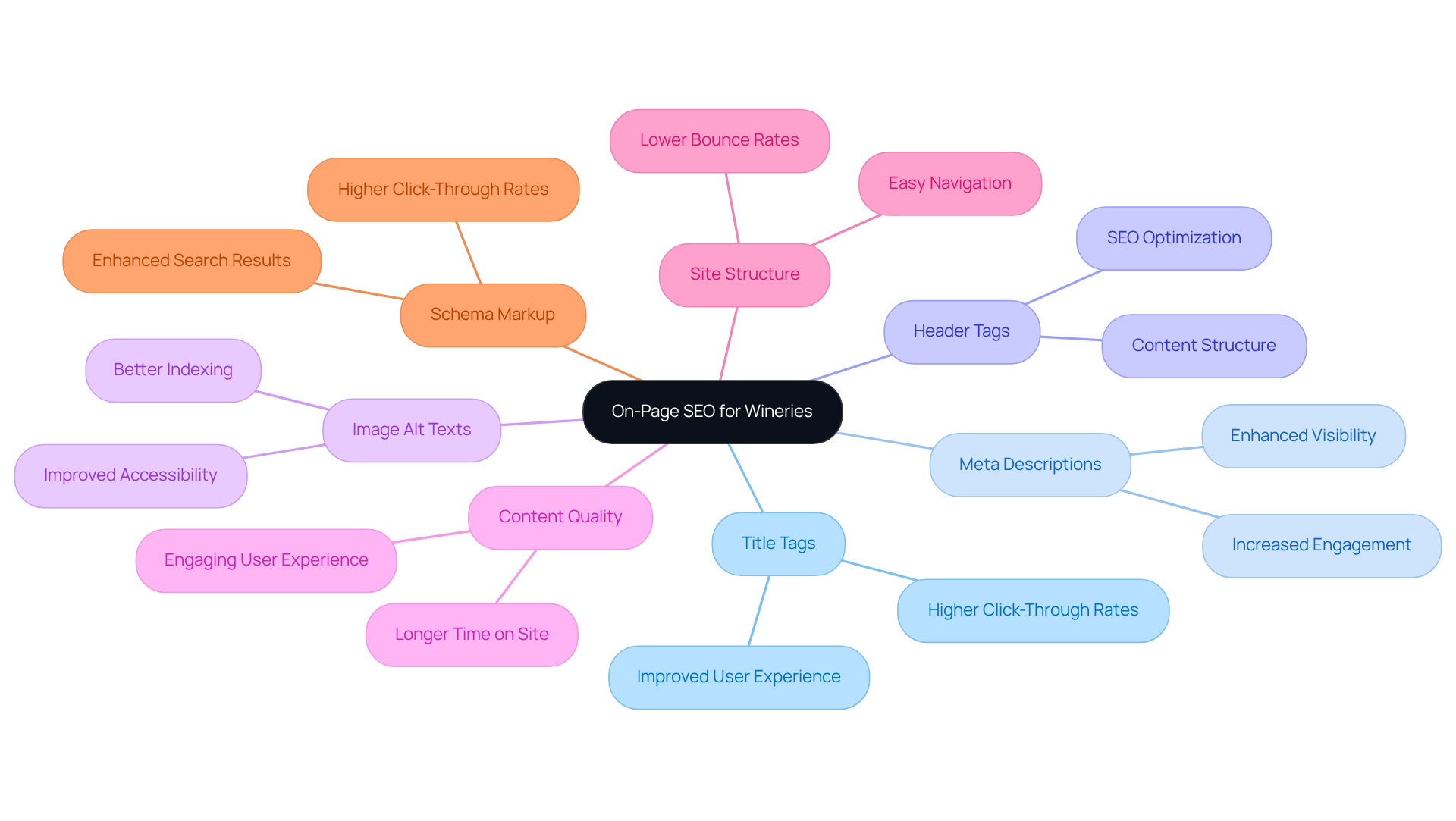
Email Marketing: Nurture Relationships and Drive Sales for Your Winery
Email marketing serves as a powerful tool for vineyards in enhancing their wine SEO, enabling them to cultivate lasting relationships with their clients through valuable content, exclusive promotions, and timely updates. By strategically segmenting their email lists based on client preferences and behaviors, wineries can improve their wine SEO by crafting tailored messages that resonate with a variety of audiences. Consider this: personalized recommendations and targeted newsletters can significantly boost engagement, with segmented emails achieving 30% more opens and 50% more clicks compared to their non-segmented counterparts.
Regular communication via not only drives sales but also fosters a sense of community among wine enthusiasts, enhancing our wine SEO. This approach proves particularly effective, as current clients typically spend 31% more than newcomers. Moreover, leveraging automation for welcome emails and re-engagement campaigns can further enhance interaction; welcome emails alone boast open rates as high as 68.6%.
For family-run vineyards, effective email marketing strategies involve:
- Creating engaging content that aligns with consumer interests
- Utilizing behavioral segmentation to deliver relevant offers
- Meticulously tracking essential metrics such as open rates and conversion rates
By concentrating on these strategies, wineries can bolster customer loyalty and promote sustainable growth through the implementation of wine SEO in an increasingly competitive market.
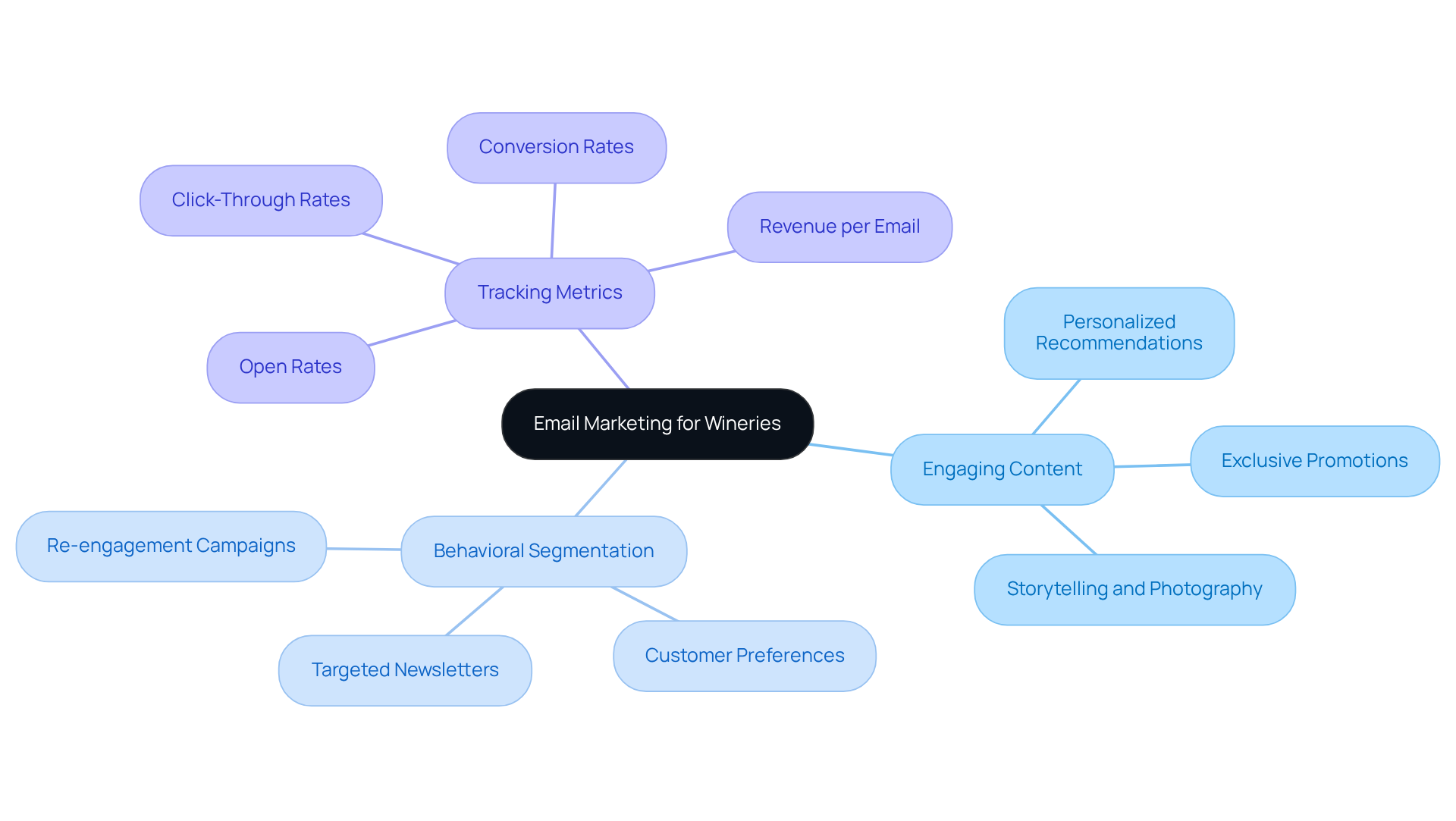
Conclusion
The strategies outlined for enhancing wine SEO and direct-to-consumer (DTC) approaches are pivotal for family-owned wineries aiming to thrive in a competitive market. By embracing innovative techniques and leveraging digital tools, these establishments can cultivate stronger connections with consumers, ultimately driving sales and fostering brand loyalty.
Key insights from the article emphasize the importance of utilizing resources like Google Search Console for performance monitoring, implementing schema markup to improve search visibility, and conducting thorough keyword research to effectively target audiences. Additionally, mobile optimization, compelling content marketing, and robust backlink strategies emerge as essential elements for enhancing online presence and authority. Each of these strategies contributes to creating a comprehensive approach that not only attracts new customers but also retains existing ones.
In a rapidly evolving digital landscape, family-owned wineries must prioritize the integration of these strategies into their marketing efforts. By doing so, they can not only achieve remarkable growth—such as the reported 191% increase in e-commerce sales—but also establish themselves as trusted brands within the wine industry. The call to action is clear: embracing these transformative wine SEO strategies is not merely an option but a necessity for wineries looking to secure their future success and engage meaningfully with wine enthusiasts.
Frequently Asked Questions
What is Enocap and its role in the wine industry?
Enocap is a consulting firm that focuses on transforming the wine industry by implementing direct-to-consumer (DTC) strategies and wine SEO. It helps family-owned vineyards establish strong sales channels and engage directly with consumers.
What are the benefits of Enocap's strategies for vineyards?
Enocap's strategies enable vineyards to achieve significant e-commerce growth, with some experiencing growth rates as high as 191%. These strategies help convert casual visitors into loyal customers and improve online sales and customer retention.
How much was the DTC sales channel for wine valued in 2021?
The DTC sales channel for wine was valued at $4.2 billion in 2021, with an 11.8% increase in average bottle prices contributing to this growth.
What is Google Search Console (GSC) and how can it benefit vineyards?
Google Search Console is a tool that helps vineyards monitor their online visibility and optimize SEO performance. It allows them to track metrics like click-through rates and keyword rankings, enabling timely adjustments to their SEO strategies.
Why is mobile usability important for vineyards using GSC?
Mobile usability is critical because 64% of inquiries are conducted on mobile devices. Enhancing mobile usability helps vineyards attract a broader audience and remain competitive in search engine results.
What is schema markup and how does it benefit wineries?
Schema markup is a type of microdata that improves how search engines interpret website content. For wineries, implementing schema specifically for wine products can enhance visibility in search results, create rich snippets, and increase click-through rates.
What types of schema should vineyards consider implementing?
Vineyards should consider implementing product schema, review schema, and price schema as part of their wine SEO strategy to enhance product visibility and stand out in a competitive market.
What is the potential impact of using schema on click-through rates?
Pages that implement schema have shown a 40% higher click-through rate compared to those that do not, indicating its effectiveness in driving traffic and engagement.
What percentage of websites currently utilize schema markup?
Only 30% of websites currently utilize schema markup, presenting a significant opportunity for vineyards to distinguish themselves in search results.




